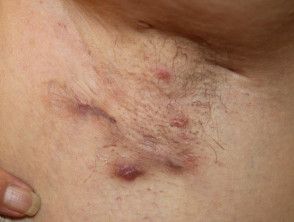- General Dermatology
- Eczema
- Alopecia
- Aesthetics
- Vitiligo
- COVID-19
- Actinic Keratosis
- Precision Medicine and Biologics
- Rare Disease
- Wound Care
- Rosacea
- Psoriasis
- Psoriatic Arthritis
- Atopic Dermatitis
- Melasma
- NP and PA
- Skin Cancer
- Hidradenitis Suppurativa
- Drug Watch
- Pigmentary Disorders
- Acne
- Pediatric Dermatology
- Practice Management
More Research Needed Regarding Dietary Considerations for Patients With Hidradenitis Suppurativa, Review Finds
Findings regarding an association between HS severity and dietary elements such as vitamin D, B12 supplementation, and more, are inconclusive.
A recent review published in the International Journal of Dermatology examined the role of dietary considerations in patients with hidradenitis suppurativa (HS), particularly its potential association with disease severity.1
As a result of the review, researchers Vural et al noted that previous findings regarding the role of dietary interventions in HS are uncertain and inconclusive. In their initial hypothesis, researchers cited the associations between HS and lifestyle. It has been established that lifestyle and health variables such as smoking status, obesity, and more are associated with a heightened risk, severity, or triggered onset of HS.2-3
Researchers began by conducting a literature search on PubMed, Scopus, Google Scholar, and Medline, including relevant records published between 1943 and September 2023. They used search terms including "hidradenitis suppurativa," "diet," and related dietary elements such as "vitamin D," "alcohol," "zinc," and "dairy," among others.
The initial search yielded 8,259 articles. However, after removing duplicate records and screening for eligibility, a total of 46 related studies were included for review. Included in the 46 studies were a total of 5,555 patients.
Questionnaire studies revealed that many patients identified specific exacerbating foods, with some reporting symptom improvement after dietary alterations. The StuffThatWorks questionnaire revealed that among Hurley stage I patients, dietary changes and turmeric were perceived as more effective than tetracyclines for symptom management.
Several beneficial dietary changes were reported, including various exclusion diets and lifestyle modifications. The Western diet, characterized by high-glycemic index foods, red meat, dairy, and egg protein, has been associated with acne vulgaris, suggesting a potential negative impact on HS. Patient experiences support this link, with dairy being the most reported exacerbating factor, followed by high-glycemic index foods and red meat consumption.
Studies reported improved HS symptoms and fewer flare-ups following a yeast-free diet, with some patients showing inflammatory lesion flares after accidental yeast consumption.
Additionally, alcohol consumption among HS patients are inconclusive, with some studies suggesting a higher rate of local HS recurrences following wide-excision surgery in patients who consume alcohol.
The Mediterranean diet, known for its positive impact on overall health, has been linked to lower HS severity. Adherence to this diet could potentially be a supportive factor in managing HS and reducing its clinical severity, the review found.
Intermittent fasting showed improvement in HS severity, but patients were already undergoing systemic therapies, making it challenging to isolate the diet's effects.
Zinc and vitamin D supplementation have been considered adjunctive therapies for HS. Studies have shown lower serum zinc and vitamin D levels in HS patients compared to healthy controls, with supplementation potentially improving disease outcomes. Other micronutrients like myoinositol, riboflavin, and vitamin B12 have also shown promise in managing HS, but further research is needed to understand their optimal use and potential adverse effects.
"Navigating hidradenitis suppurativa management reveals uncertainty about the role of dietary interventions as a result of the absence of robust controlled clinical studies with diverse patient cohorts," according to Vural et al. "It is essential to approach dietary changes with caution, recognizing that they cannot stand alone as a comprehensive solution to the multifaceted challenges posed by HS. Medical therapy remains the mainstay of treatment, highlighting the need to explore further effective interventions."
References
- Vural S, Baskurt D, Yıldırıcı Ş, Rasulova G, Danacı S, Botsalı A. Evaluating dietary considerations in hidradenitis suppurativa: a critical examination of existing knowledge. Int J Dermatol. February 26, 2024. Accessed February 27, 2024. https://doi.org/10.1111/ijd.17101
- Lipa K, Zajac N, Owczarek W, Ciechanowicz P, Szymanska E, Walecka I. Does smoking affect your skin? Postepy Dermatol Alergol. 2021; 38(3): 371–376.
- Kromann CB, Ibler KS, Kristiansen VB, Jemec GB. The influence of body weight on the prevalence and severity of hidradenitis suppurativa. Acta Derm Venereol. 2014; 94(5): 553–557.

